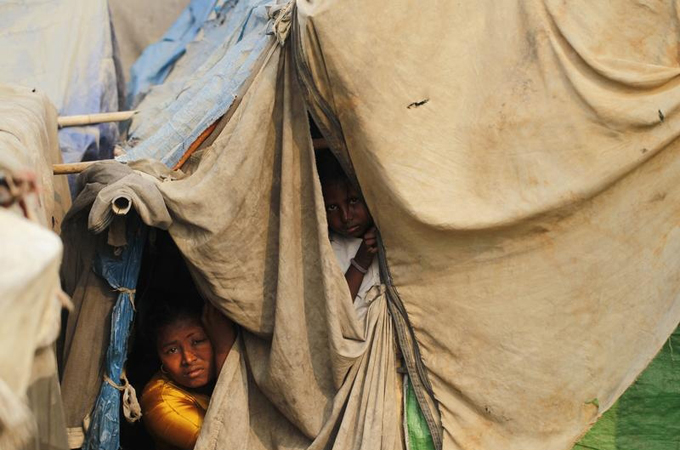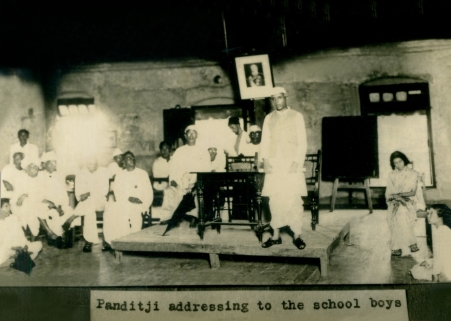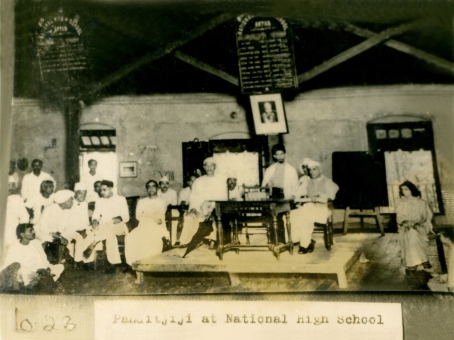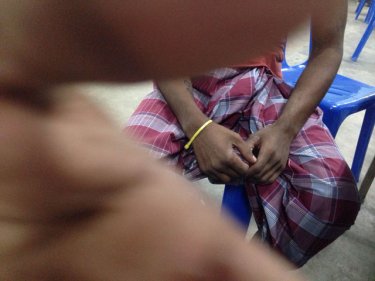|
Draft resolutions urges 'access to full citizenship on equal basis' for Myanmar's Rohingya Muslims.
Last updated: 01 Nov 2014 00:54
|

The violence has displaced some 140,000 Rohingya Muslims [Reuters]
|
|
A new UN draft resolution takes aim at Myanmar's
aggressive campaign to have its Rohingya Muslims identify as a term they
reject, urging "access to full citizenship on an equal basis." The European Union-drafted resolution, obtained on Friday by The Associated Press, puts pressure on the Southeast Asian country to change its campaign, preferably before world leaders including President Barack Obama arrive for a regional summit in less than two weeks. Myanmar's 1.3 million Rohingya have been denied citizenship and have almost no rights. Attacks by Buddhist mobs have left hundreds dead and 140,000 trapped in camps. Others are fleeing the country. Authorities want to officially categorise the Rohingya as "Bengalis," implying they are illegal migrants from neighbouring Bangladesh. The Rohingya counter that many of their families have been in Myanmar for generations. Effectively stateless, they are wanted by neither country and say the Myanmar government's campaign feels like an effort to have them systematically erased. The vast majority of Rohingya live in the state of Rakhine. President Thein Sein, a former general, is considering a "Rakhine Action Plan" that would make people who identify themselves as Rohingya not only ineligible for citizenship but candidates for detainment and possible deportation. The resolution now before the General Assembly's human rights committee is nonbinding, but a strong vote in its support would send a message that international opinion is not on Myanmar's side. The resolution expresses "serious concern" about the Rohingya's status. It calls on the government to "allow freedom of movement and equal access to full citizenship for the Rohingya minority" and to "allow self-identification." Myanmar's plan worries some in the Muslim world, and the Organization for Islamic Cooperation pushed for strong language in the resolution. The Rohingya have emerged as a sensitive issue as Myanmar, a predominantly Buddhist state, tries to move away from decades of repressive military rule toward democracy. This week, Myanmar's ambassador to the United Nations, Tim Kyaw, told the General Assembly's human rights committee that his country is not "targeting a religion." He warned that "insisting on the right to self-identification will only impose obstacles to finding a lasting solution" to ethnic tensions. Vijay Nambiar, the UN secretary-general's special adviser on Myanmar, told AP this week that Myanmar's government is facing increasing pressure to allow the Rohingya to identify as something other than Rohingya or Bengali. But, Nambiar said, "In the immediate future, the government says that's not possible." |
 Crowds hold U.S. flags as President Barack Obama's motorcade
drives through Yangon on November 19, 2012. Obama became the first
serving U.S. president to visit Myanmar (Jason Reed/Courtesy: Reuters).
Crowds hold U.S. flags as President Barack Obama's motorcade
drives through Yangon on November 19, 2012. Obama became the first
serving U.S. president to visit Myanmar (Jason Reed/Courtesy: Reuters).
In November, President Obama will travel to Myanmar to attend the East Asia Summit, which brings together a broad range of nations from across the Pacific Rim. It will be the president’s second trip to Myanmar, following his landmark 2012 trip, which was the first by a sitting U.S. president to Myanmar since the country gained independence six decades ago. During the East Asia Summit, Obama almost surely will hold bilateral meetings with Myanmar President Thein Sein and other senior Myanmar leaders, including opposition leader Aung San Suu Kyi.
In addition, since the high point of Myanmar’s reform process in 2012 and early 2013, the country’s political opening has stalled and, in my opinion, slid backwards.
The recent murder of a Myanmar journalist while in army custody has highlighted the regression of the country’s media environment since 2012 and 2013. Although the online and print media in Myanmar remains far freer than it ever was under junta rule, journalists are once again being harassed, detained, tried—and apparently, murdered—by the military and police. In addition, journalists who dare the cover the conflict in western Myanmar’s Arakan State, where violence against Rohingya Muslims continues unabated, face severe threat from Buddhist paramilitary groups and their supporters.
The deteriorating media environment is not the only sign of Myanmar’s backsliding. Cease-fires between the government and several ethnic minority insurgencies are collapsing, with the insurgents and the army preparing for war again. Arakan State remains a humanitarian emergency, and Thein Sein’s government has taken few constructive measures to help restore order and rights in Arakan State. The government initially simply denied the violence in Arakan State, pretending that massacres of Rohingya had not happened and tossing foreign aid groups out of Arakan State. Now, the Thein Sein government has come up with a plan for the Rohingya that is unworkable and simply racist: It wants the Rohingya to identify themselves as “Bengali” if they want to be granted Myanmar citizenship. If they do not accept this identification, the government plans to toss more Rohingya into detention camps. (A previous, military government stripped the Rohingya of their citizenship, though many of them had lived in Myanmar for generations.) But self-identifying as Bengali is akin to Rohingya marking themselves as foreigners, since to them—and to other Burmese—the term Bengali suggests that they are not indeed from Myanmar, came to Myanmar illegally, and thus can be discriminated against.
Rohingya have few options. The NGO Arakan Project recently reported that over 100,000 Rohingya have fled Myanmar in the past two years, with many dying at sea or finding themselves at the mercy of pirates, the ruthless Thai navy, and a human slavery trade that runs through Thailand.
Obama thus should use his time in Myanmar to highlight to Naypyidaw that, although the Obama administration has made rapprochement with Myanmar a major goal of its Asia policy, rapprochement increasingly depends on continued political reform in Myanmar. A rigged 2015 election, Obama should warn Naypyidaw, would immediately undermine U.S.-Myanmar relations, and a return to all-out war with ethnic insurgencies also should be a serious impediment to closer ties. Finally, Obama should make clear that the Thein Sein government’s proposed plan for the Rohingya is unsatisfactory and outright racist.
In my next post, I will look at how, despite its rich natural resources and large, untapped consumer market, Myanmar has thus far proven relatively unattractive for U.S. companies. As an article in the Wall Street Journal noted, despite the relaxation of U.S. sanctions on Myanmar, as of August 2014 U.S. companies have committed less than $250 million to investments in the country of fifty million people, a minuscule amount for a market the size of Myanmar.









 UN Rapporteur: ‘
UN Rapporteur: ‘


 What
makes the story more amazing is that Winton told no-one about it, not
even his wife Grete. 50 years later, in 1988, she came across a
scrap-book in the attic full of pictures of the rescued children, with a
list of their names. The story was published for the first time, and
Winton was knighted by Queen Elizabeth, and honoured by the US House of
Representatives.
What
makes the story more amazing is that Winton told no-one about it, not
even his wife Grete. 50 years later, in 1988, she came across a
scrap-book in the attic full of pictures of the rescued children, with a
list of their names. The story was published for the first time, and
Winton was knighted by Queen Elizabeth, and honoured by the US House of
Representatives. In
a memorable scene Sir Nicholas Winton meets his 'rescued kids', now
ageing adults, for the first time on the BBC programme 'That's Life ' in
1988, and is reduced to tears. To quote the Director of the film " It
is incredible that all these people live today, due to the heroic deeds
of one man !"
In
a memorable scene Sir Nicholas Winton meets his 'rescued kids', now
ageing adults, for the first time on the BBC programme 'That's Life ' in
1988, and is reduced to tears. To quote the Director of the film " It
is incredible that all these people live today, due to the heroic deeds
of one man !"











